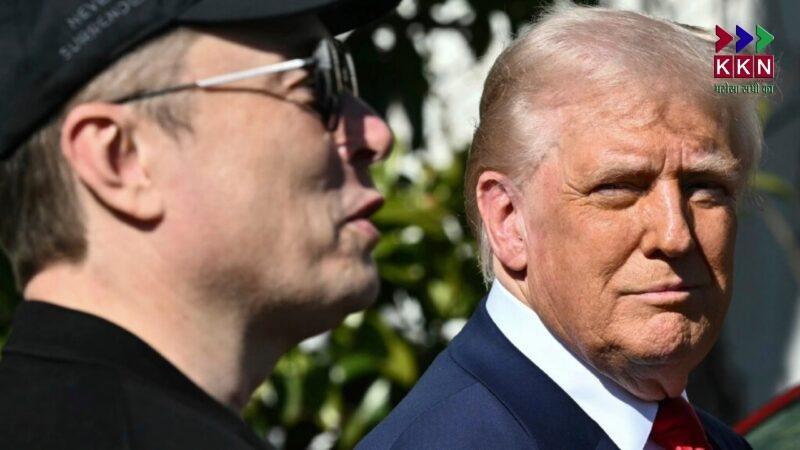The political tensions between former U.S. President Donald Trump and billionaire entrepreneur Elon Musk have taken a dramatic new turn, as Trump has allegedly threatened to cut off federal subsidies to Musk’s companies. The former president even went so far as to suggest the possibility of deporting Elon Musk from the United States — a comment that has sparked widespread controversy across political and business circles.
Article Contents
This escalating conflict comes just days after Elon Musk made headlines by announcing the formation of a new political party named the “America Party”, signaling his direct challenge to Trump’s leadership and his growing influence in conservative circles.
Elon Musk Launches ‘America Party’: A Direct Political Challenge to Trump
The roots of the feud lie in Musk’s recent political declaration. In a surprise move, Musk launched a new national political outfit — the America Party — positioning himself as a reformist alternative to traditional Republican and Democratic ideologies. Sources close to Musk say his intention is to “restore innovation, truth, and future-focused governance” to American politics.
While Musk has previously hinted at political ambitions, this formal announcement marks his most serious foray yet. Political analysts say the timing is crucial, especially with the 2026 midterm elections on the horizon and the 2028 presidential race already warming up.
Key Objectives of the America Party:
-
Pro-innovation governance
-
Free-market capitalism
-
Emphasis on technology and infrastructure
-
A break from traditional party politics
Trump Responds With Sharp Threats: “No Subsidies for Musk”
Donald Trump, who remains a powerful force in American politics and a likely 2028 presidential contender, did not take Musk’s challenge lightly. Speaking at a conservative rally in Texas, Trump made strong remarks suggesting that if Musk enters politics against him, the government could reconsider all financial support and contracts awarded to Musk’s ventures, including SpaceX, Tesla, and Neuralink.
“If Elon wants to play politics, maybe he shouldn’t be living off taxpayer money. Maybe he shouldn’t even be living in America,” Trump reportedly said, triggering gasps and applause in equal measure.
This is not the first time Trump has clashed with high-profile tech figures, but threatening to revoke government subsidies and hinting at exile is a bold escalation, even by Trump’s standards.
How Much Do Musk’s Companies Rely on Federal Subsidies?
Elon Musk’s business empire has certainly benefited from public-private partnerships and federal contracts:
-
SpaceX has multi-billion-dollar deals with NASA and the U.S. Department of Defense.
-
Tesla has received tax incentives and environmental subsidies for manufacturing and promoting electric vehicles.
-
Neuralink and The Boring Company have also pursued government-linked infrastructure and research partnerships.
While Musk has also built substantial private funding and investor capital, federal support has played a role in scaling his ventures, especially during their early stages. Political analysts suggest that if Trump returns to power and acts on these threats, Musk’s business interests could face serious headwinds.
Public and Political Reactions
Trump’s remarks have drawn criticism from across the political spectrum. While some of his hardline supporters praised the comments as “strong leadership,” many moderates and liberals denounced them as authoritarian and anti-innovation.
Notable Reactions:
-
Senator Elizabeth Warren tweeted: “Threatening to deport a U.S. entrepreneur for political competition is un-American.”
-
Fox Business Analyst Charles Payne said: “Musk is the engine of American innovation. Undermining him for personal politics would be a disaster.”
-
Independent voters and libertarians appear divided — some support Musk’s new party while others fear it could split the anti-Trump vote.
Can a New Political Party Succeed in the U.S.?
Historically, third-party movements in America have struggled to gain national traction. From Ross Perot’s Reform Party to Ralph Nader’s Green Party efforts, the two-party system has proven resilient. However, experts note that Musk’s charisma, financial muscle, and massive online following could give him a unique advantage.
The America Party, if structured properly, could:
-
Attract disillusioned Republican voters
-
Pull in centrists and technocrats
-
Engage younger, tech-savvy demographics
Moreover, Musk’s platforms like X (formerly Twitter), and his influence in the tech world, provide him with a direct communication channel to millions — bypassing traditional media narratives.
What This Means for 2028 and Beyond
With both Donald Trump and Elon Musk eyeing political influence in the coming years, the 2028 U.S. presidential race could be unlike any in modern history. While Trump relies on populist appeal and party loyalty, Musk is banking on disruption and forward-thinking policies.
If the battle intensifies:
-
Trump may double down on policy threats.
-
Musk could respond with grassroots mobilization and digital campaigns.
-
The Republican vote could fracture, giving Democrats an unexpected edge.
The Trump vs. Musk confrontation is more than a personal rivalry — it’s a battle between two contrasting visions of America’s future. Trump, representing nationalism and populism, is up against Musk, the face of technological progress and political disruption.
Whether Trump will act on his threat to revoke federal subsidies or consider Musk’s deportation remains to be seen. What’s clear is that the political landscape in the U.S. is shifting rapidly — and the entry of a powerful outsider like Elon Musk could redefine the rules of the game.
For real-time updates on U.S. politics, business rivalries, and global headlines, stay with KKNLive.com — where analysis meets accuracy.




